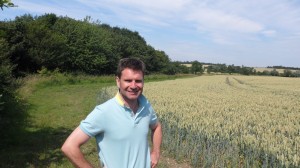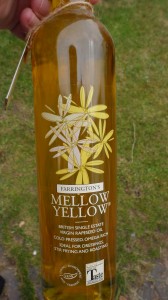
Yesterday I visited one of my favourite local farmers.
Duncan Farrington has pulled off an amazing trick – he has made a commodity into a luxury. And he has got Nigella Lawson to back him.
I first met Duncan a good few years ago when I volunteered to do some bird surveys for the RSPB Volunteer and Farmer Alliance scheme. This scheme puts local birders (like me) in touch with local farmers (like Duncan). The birder visits the farm a few times and provides a list of species seen so that the farmer has a better idea of which bits of the farm are important for which birds.
We got off to an interesting start as when I ‘phoned up, Duncan immediately said ‘Isn’t there someone called Avery who works for the RSPB?’ so my cover was blown straight away. But actually that was probably good as we got into discussions about farming and conservation right from the start.
Duncan is a LEAF farmer – where LEAF is Linking Environment and Farming. I’m not sure that LEAF is a great name, but I do think that LEAF is a pretty good idea, although it is an idea that has some snags, except when I listen to Duncan those snags tend to recede in my brain.
LEAF farmers work in an environmentally friendly way but not to a strict regimen or prescribed method such as organic farming. So one of the snags is that every LEAF farm is different and every LEAF farmer is different – it’s a mindset but not necessarily a recipe to follow slavishly. Duncan’s farm, Bottom Farm at Hargrave, is a LEAF Demonstration farm which means that Duncan is used to talking to school children, the general public and other farmers about what he gets up to – and he’s very good at it.
As we walked around some of his fields Duncan was keen to show me a flower-rich margin which is already looking good with wild carrot, speedwell and yarrow and with meadow browns, ringlets and large whites flying over it. The wheat field next to us has had no phosphate fertiliser for about 15 years as Duncan believes that the key is to raise the organic matter content of the soil and to get a living soil which makes the existing minerals more available to the plants. Since the world is going to run out of phosphates in the not too distant future, and they cost money anyway, Duncan has put a lot of effort into working out ways of managing without phosphate fertilisers on his farm.
He spoke passionately about Albrecht soil tests, cation exchange capacity and soil organic matter. I got the point that it’s not how much of a particular mineral there is, it’s the availability to the plant which is important and that depends on the organic matter of the soil. More organic matter means that the minerals are made more available to plants and so you don’t have to pour on as much expensive inorganic fertiliser.
The surveys I did several years ago on Duncan’s farm had shown that whatever the life in the soil there was plenty of life above it. A pair of turtle doves is a Northants rarity, there were two pairs of lapwings, lots of skylarks, yellowhammers and linnets. There are just a few grey partridges still on the farm (or nearby) and barn owls nest too. Yesterday we didn’t see all those species but it was good to hear so many skylarks singing and good to see that they were enjoying the skylark patches which Duncan has had for several years. Duncan tells me that the turtle doves are still around and I told him that is something of which to be really proud.
This year’s dry conditions have knocked wheat yields down by an estimated 20% and many local farmers will be hoping for good weather between now and an early harvest in 2-3 weeks time (about 2 weeks early). Before that comes the rape harvest and there the yields are unpredictable but again the harvest is likely to be about a week early in a couple of weeks time. But the clay soils of Northants have done much better than drier soils further east or south so Duncan is counting his blessings.
Duncan isn’t one to complain, in fact he said that ‘farming for combinable crops is on the crest of a wave’ at the moment with wheat prices around £150/tonne. Duncan sees himself as ‘a conservation farmer but a realistic farmer’ and tells me that ‘ farming needs to be sustainable and that means it needs to make money in the long term’.
In his early days of farming with his father after leaving Wye College in the early 1990s times were testing. It was a struggle to break even, even with Duncan’s keenness for resource efficiency and diversification. And it was in the early 2000s that Duncan’s mind went back to thinking about what he learned at University about the healthy properties of rape oil.
 The name Mellow Yellow for their cold-pressed rape oil came from an evening with a bunch of friends and a pile of post-it notes.
The name Mellow Yellow for their cold-pressed rape oil came from an evening with a bunch of friends and a pile of post-it notes.
And they are doing all right. Oilseed rape is usually regarded as a break crop – a broad-leaved crop in the crop rotation which allows herbicides to be applied that will hammer the grass weeds, particularly ‘black grass’, that reduce wheat yields in these parts. But at Bottom Farm the break crop has become a nice little earner as Mellow Yellow gains awards and prizes, sneaks into more and more supermarkets and is even used by Nigella Lawson on TV.
And it’s not just the Farrington family and their customers who benefit from this – an extra eight jobs have been created with all that pressing, bottling and packaging and those jobs have gone to local people in Hargrave, Stanwick, Thrapston, Titchmarsh and Kimbolton.
I like Mellow Yellow and I like Duncan’s approach to farming. He looks after the soil, he looks after the wildlife and he makes money out of his break crop. That’s a great combination in this day and age. The more farmers we have like Duncan the better the farming industry will be and the better our countryside – and I guess the better our food and health too.
[registration_form]
So my kind of farmer. If only there were more. He’s absolutely right about the organic matter. It’s crucial to build a protective membrane which in turn feeds the beasties and microbes which create soil fertility. Other than the organic brigade, too few farmers understand their soils. Soil degradation is being perpetrated through ignorance not just from farmers but the self interested agro chemical companies and even the colleges who are obsessed with “efficiency”. If ever there was a word that is misused, it is that one. The rich green strong leafy crops created from use of artificial fertilisers, in particular nitrogen, gull the farmer into thinking all is well, but plant immune systems are then compromised requiring remedial herbicides and pesticides.
Soil is a living ecosystem that suffers when exposed to sunlight or winter. Like humans, its living organisms need protection.
Someone suggested that the SFP should be dependent on fertile soil depth measurements. If fertility and depth are lost you lose your payment until its restored. The New Zealanders have devised a measurement for soil fertility, I think it’s called the BRINX method. We should have learned from the experience of the American Mid West in the early 1900s.
Daye – keep coming back to this website please! I’m glad you like this post at least!
That’s great Mark. My experience with carrying out these farm bird surveys is very positive and you build long lasting friendships with the farmers concerned. This year I had the pleasure of surveying a ‘Biodynamic’ farm and the bird life was incredible. I understand their produce is also pretty good and yes they make money. I think though that for large scale food production on the more industrial farms there is more of a challenge to make wildlife farming pay commercially, but actually even the larger companies will have to become more ‘socially responsible’ in how they do things if they want to succeed in the future.
Gert – I’m never quite sure what biodynamic is – except I’m fairly sure I’m not it! I’ll have to find out!
Great blog Mark, thanks for coming out yesterday – always good to swap ideas with you. Re the organic content, I agree with Daye Tucker that we should be increasing it, and what I have shown is that with the correct aproach it can be done relatively easily. However I disagree if the suggestion is that I am not an efficient farmer. People often think that only small and inefficient agriculture can produce good environmental conditions, when quite the reverse is the case. What we do here at Bottom Farm is a perfect case in point of LEAF farming practices of IFM (Integrated Farm Management) which gives a all emcompassing approach to viable agriculture http://www.leafuk.org/leaf/home.eb . It is in a known fact that Integrated farming systems like ours are far superior when it comes to building soil organic matter when compared to both ‘conventional’ and ‘organic’ farming systems.
It is a very interesting and large topic, that is often not looked seriously by many quarters. But there is a lot me we can all learn to improve the way we produce quality, nutritious food, sustainably and efficiently.
Duncan – it was good to see you and have another look at your farm. A pleasure for me. best wishes m
I don’t have anything very technical to add, except that once again your blog seems to be eerily mirroring my day – a chunk of which was spent collecting beetle samples on the edge of a field of rapidly ripening rapeseed! Lots of poppies etc growing in the edge of the crop, and plenty of butterflies again on the grassy margins alongside, so well managed I think. LEAF really does seem to work, hopefully we’ll see it and similar schemes expand, and perhaps work on getting more recognition amongst consumers, especially the growing band of people (I hope) who want to support wildlife with their purchases.
In addition, I have a bottle of Mellow Yellow in the cupboard. Just put a good glug into the bread now baking in the oven, probably be dressing my salad with it + cider vinegar this evening. Delicious! Tastes all the better having read your blog. Thanks.
I’m not following you around – honestly!
Unless you spent most of yesterday doing data entry or going to classical concerts, I believe you! But I’ll keep looking over my shoulder